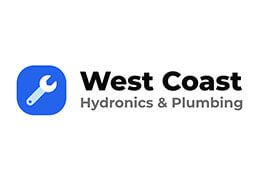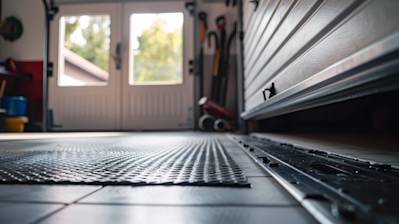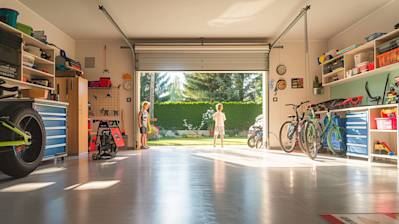Choosing the best garage door lubricant is essential for maintaining the operation and longevity of your garage door system. It's one thing many homeowners neglect, but it can significantly reduce the wear and tear on your garage door setup, making it last much longer and run much smoother.
Garage door lubricants are not all created equal, and because your garage door system includes various materials and parts that each require careful consideration, you cannot just use any old lubricant you have lying around in your shed or garage.
The Importance of Utilizing Garage Door Lubricants
Garage Door Lifespan and Performance
Regular use of quality garage door lubricants can increase the lifespan of your garage door system. Lubricants reduce the friction between the moving parts of the door machinery, thus reducing the wear and tear on the system. Less friction often means less noise, so your garage door can open and close more quietly.
Prevent Damage from Weather Conditions
Garage door lubricants can also provide protection against damage from varying weather conditions. Many lubricants have protective properties that shield against rust and corrosion, crucial in areas that experience heavy rains or salty sea air.
Saving Money in the Long Run
Employing a quality garage door lubricant keeps your door in peak condition, preventing minor issues from turning into significant, costly damages down the line.
Variables to Consider When Choosing a Garage Door Lubricant
When it comes to selecting the best garage door lubricant, several factors need consideration. These include the lubricant type, the applicator style, and the properties of the lubricant itself.
Lubricant Type
Garage door lubricants primarily come in three types: silicone-based, oil-based, and lithium-based.
Silicone-based Lubricants
Silicone-based lubricants have excellent water-repellent properties, making them a good choice for areas with high humidity or a lot of rain. They are safe to use on most materials, including metal, rubber, and vinyl.
Oil-based Lubricants
Oil-based lubricants are often heavier and thicker than their counterparts, excellent for heavy-duty applications. However, they can attract dirt and dust over time, which can create a grime build-up that can be problematic for garage door components.
Lithium-based Lubricants
Lithium-based lubricants are usually in the form of white lithium grease. They are durable, long-lasting, and offer excellent protection against rust and corrosion. However, like oil-based lubricants, they can attract dirt over time.
Applicator Style
Depending on the brand and model, garage door lubricants can come in a spray can with a straw applicator, a squeeze bottle, or even a brush-on tub. The spray can with the straw applicator is generally the easiest to use, allowing you to get into tight spaces with minimal effort.
Lubricant Properties
When selecting a garage door lubricant, look for one that doesn't attract dirt or dust, as this can gum up the moving parts and result in even more friction. Also, look for a lubricant that offers protection against rust and corrosion, especially if you live in a humid or coastal region.
Top Garage Door Lubricants on the Market
WD-40 Specialist White Lithium Grease
The WD-40 Specialist White Lithium Grease is a reliable product that offers long-lasting lubrication and excellent protection against rust and corrosion. This product is safe for use on most materials and has a straw applicator for precision targeting.
3-IN-ONE Professional Garage Door Lubricant
This professional-grade lubricant from 3-IN-ONE is specially formulated for use on garage door systems and offers a quick-drying no-drip formula that attracts less dust and dirt. The straw applicator allows for precision application.
B’laster Garage Door Lubricant
The B'laster Garage Door Lubricant is a silicone-based lubricant that is exceptionally water-resistant, making it suitable for climates with high humidity or lots of rain.
CRC White Lithium Grease
The CRC White Lithium Grease offers reliable performance in a range of temperatures, making it an excellent choice for regions with extreme climates. This product is resistant to water and heat and provides excellent protection against corrosion.
Final Thoughts on Garage Door Lubricants

Frequently Asked Questions about Best Garage Door Lubricant
What Types of Garage Door Lubricants Are Available?
Different types of garage door lubricants are available in the market, each having its specific benefits. Some of the popular options include white lithium grease, silicone spray, and WD-40. White lithium grease is a lightweight, long-lasting lubricant ideal for metal-to-metal applications. Silicone spray is a great option for plastic parts, and WD-40 excels in preventing rust and corrosion.
How Should I Apply Garage Door Lubricant?
Before applying the garage door lubricant, it's crucial to clean the garage door parts. Remove any dirt or debris present. Then, using the can's straw, apply the lubricant evenly along the tracks, rollers, and hinges. Give the door a few open-close cycles to ensure the lubricant is well distributed.
How Often Should I Apply Garage Door Lubricant?
The frequency of applying garage door lubricant can depend upon the weather conditions and how often you use the garage door. However, it is generally recommended to apply lubricant every three to six months to keep your garage door working efficiently.
What Happens If I Don’t Use Any Garage Door Lubricant?
Without the application of a suitable garage door lubricant, the metal parts of your garage door can slowly degrade due to friction and rust. This could reduce the lifespan of your garage door and potentially lead to costly repairs.
Are There Specific Brands That Produce the Best Garage Door Lubricant?
Various brands produce reliable garage door lubricants. Some of the well-known brands include WD-40, 3-IN-ONE, CRC, and B’laster. Each of these brands offers particular strengths, be it rust prevention or long-lasting lubrication.
Can I Use Any Oil as a Garage Door Lubricant?
While it might be tempting to use any oil as a garage door lubricant, it's not recommended. General oils are not created to withstand various weather conditions. They also tend to attract dirt more easily, which can cause problems in the long run. Instead, use a quality garage door lubricant designed specifically for such applications.
Can Garage Door Lubricant Help Reduce Noise?
Yes, one of the critical functions of a garage door lubricant is to reduce noise caused by metal-to-metal contact. Lubricants allow for smoother operation, reducing the grinding sounds often heard when using an untreated garage door.
Can I Use Garage Door Lubricant on the Door’s Exterior Panels?
Generally, garage door lubricants are not recommended for use on exterior panels as they could discolor or damage the finish. Lubricant is intended for use on moving parts like hinges, tracks, and rollers. So, if your door's exterior needs treatment, consider using a suitable cleaning product or paint+.

Pros of Best Garage Door Lubricant
Enhances the Lifespan of Garage Doors
One of the significant merits of the best garage door lubricant is increasing the lifespan of the garage door and enhancing its efficiency. Garage doors contain numerous moving parts that might wear out over time due to friction. The best garage door lubricant reduces this friction, preventing wear and tear on your garage door components, which in turn extends the life of the whole garage door system.
Lowers Noise Levels
Reduced Squeaking and Grinding
Garage doors can produce squeaking noises because of the interaction between the metallic parts. When you use a high-quality lubricant, it penetrates these parts and reduces friction, thus eliminating any squeaky or grinding sounds. The result is a smoother, quieter operation every time you open or close your garage door.
Enhances Overall Performance
Regular use of a good garage door lubricant ensures the door parts are not limited by friction, which in turn enhances its overall performance. Whether it's a roller door, up-and-over door, sectional door, or a swing-hung door, using best garage door lubricant maintains the door's functionality and ensures it opens and closes smoothly.
Easy to Apply
Most high-quality garage door lubricants come in easy-to-use spray cans that make the lubrication process straightforward and quick. You don't need any specialized tools or professional expertise to apply the lubricant, which saves time and money.
Versatility
Top-grade garage door lubricants are not limited to just garage doors. They can efficiently work on other home utilities that require lubrication, like hinges, locks, and other domestic machinery. This versatility adds to the value you get for your money.
Cons of Best Garage Door Lubricant
Repeated Application
Frequency
One of the main drawbacks of garage door lubricants is the need for frequent reapplication. The lubricant does not last forever, and you have to keep reapplying it to ensure efficient operation of your garage door. Depending on the usage and weather conditions, you may need to reapply the lubricant every few months to maintain optimal functionality.
Time Consuming
Although the application process may be simple, it may still take a reasonable amount of time, particularly if you have a large or complicated garage door system. Moreover, the time associated with buying the lubricant and applying it may be seen as a disadvantage.
Choosing the Right One
Abundance
There is an abundance of garage door lubricants on the market, some of which may not be suitable for your specific garage door material or model. Choosing the wrong one could result in damage, inefficiencies, or even risks to safety.
Expert Guidance
A non-professional individual may not know the right type of lubricant to pick for their garage door, resulting in the need to seek expert guidance, which may be inconvenient or incur additional costs.
Over Application
There's always a risk of over-application when it comes to garage door lubricants. Applying excessive lubricant may lead to a build-up that attracts dust and dirt, which can clog your door mechanism and undermine the lubricant's function.
Cost
While one-time purchase costs might not be prohibitive, the cumulative costs over time for a top-quality garage door lubricant might be substantial, especially when considering the need for frequent reapplication.

Myths/Misconceptions about Garage Door Lubricants
As people continue to strive for a smooth-functioning garage door, they frequently seek advice and guidance on the most effective lubricants to use. Unfortunately, this search often results in exposure to some common myths and misconceptions about garage door lubricants. Below are explained some of these misconceptions.
Myth 1: All Lubricants are Suitable for Garage Doors
A widespread misconception many hold is that all types of lubricants are suitable and effective for maintaining seamless garage door operations.
Fact:
The truth is, not every lubricant is suitable for a garage door. Some types, particularly the oil and grease-based ones, can attract dust and grit, which over time can form a sludge that impedes the functioning of your garage door. Hence, it's usually recommended to use a silicone or lithium-based lubricant specifically designed for garage doors as they do not attract dirt and debris and ensure smoother functioning.
Myth 2: Lubrication is Not Required for New Garage Doors
Many believe that new garage doors do not require lubrication until they have been in use for some time.
Fact:
Even new garage doors can benefit from the right lubrication. Lubricating a new door can help enhance its operation and extend its lifespan. It's a preventative treatment that can save you from future maintenance and repair costs.
Myth 3: WD-40 is the Best Lubricant for Garage Doors
A common myth is that WD-40, known for its wide range of uses, is the best lubricant for a garage door.
Fact:
Despite its popularity and versatility, WD-40 is not a lubricant – it actually serves as a water displacer and rust dissolver. Though it can provide a short-term fix for some squeaky door issues, it is not an ideal long-term solution for a squeaky garage door. Silicone or lithium-based lubricants are typically recommended for best results.
Myth 4: More Lubricant Means Better Operation
Some people are of the opinion that the more lubricant they apply, the smoother their garage door will function.
Fact:
Applying excessive lubricant can actually cause more harm than good. It can attract more dirt and grit, lead to build-up and cause overall damage to your garage door. The right amount of lubricant will offer a quiet, seamless operation without causing any negative impact. Generally, a thin layer of lubricant is all that is required.
Myth 5: Garage Doors only Require Lubrication Once a Year
Many believe that lubricating a garage door once a year is good enough.
Fact:
While the frequency of lubrication can depend on various factors such as the climate, frequency of door usage, and the age of the door, in general, a garage door requires lubrication at least twice a year. In more harsh environments or with increased use, more frequent lubrication may be advised.
Myth 6: You Can Lubricate a Garage Door with Cooking Oil
It's a common myth that cooking oil can serve as an effective makeshift lubricant for a garage door.
Fact:
Cooking oil should never be used as a substitute for proper garage door lubricant. It cannot withstand the heat generated by the operation of the door and will dry out quickly, leaving your garage door more susceptible to squeaking and grinding. Moreover, it can also cause a sticky mess that is difficult to clean.
By becoming aware of these myths and misconceptions, you can make better-informed decisions regarding the maintenance and care of your garage door, ensuring its smooth and efficient operation for a long time.
Summary
So, there you have it folks. Applying the best garage door lubricant can be a game-changer in the functionality and longevity of your garage door system. Say goodbye to annoying creaks and squeaks, as well as the harmful rust and corrosion. Lubrication forms an essential part of the routine maintenance, ensuring that your garage door operates smoothly and quietly.
But remember, not any old lubrication will do the trick. It's always a good idea to choose the best garage door lubricant designed specifically for this purpose. Because such lubricants penetrate into the small gaps and hard-to-reach areas, helping to reduce friction, avoid rust, and increase the overall life of your garage door system.
So the next time you notice an irritating noise or a jerky movement from your garage door, don't delay the lubrication task. The best garage door lubricant will not only protect your garage system from wear and tear but also save you the cost and hassle of replacing parts earlier than necessary. Trust me, your wallet and your neighbors will thank you!
About 1A Garage Doors
1A Garage Doors is a family-owned garage door repair and installation business nestled in the heart of Sacramento, CA. We take immense pride in delivering exceptional services to our local clients. Backed by expertise and an unwavering commitment to client satisfaction, our team is equipped to handle all types of garage door tasks effortlessly - be it a simple repair or an entire door installation process. We keep our business personal, and you can always expect friendly, professional service. As a local Sacramento business, we cherish the trust and relationships we have created in our community. With 1A Garage Doors, you'll always experience top-notch service, guaranteed!








